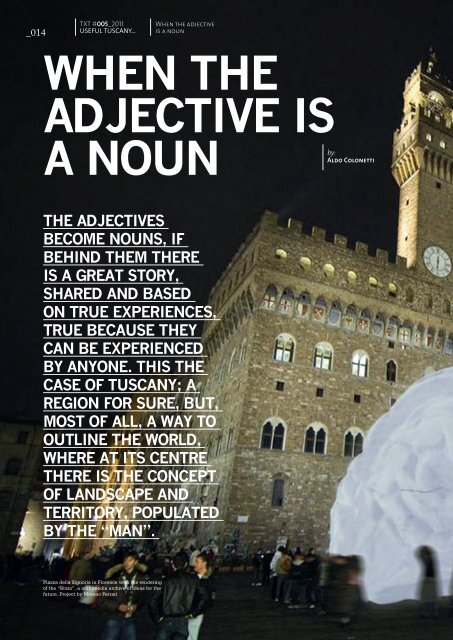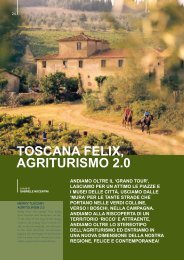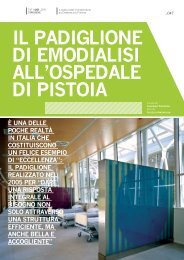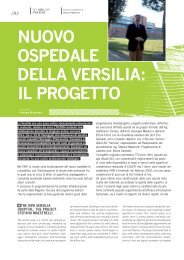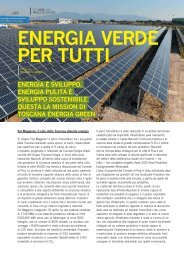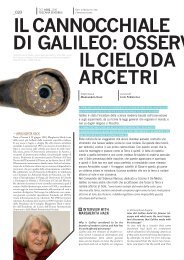WHEN THE ADJECTIVE IS A NOUN - TXTmagazine
WHEN THE ADJECTIVE IS A NOUN - TXTmagazine
WHEN THE ADJECTIVE IS A NOUN - TXTmagazine
You also want an ePaper? Increase the reach of your titles
YUMPU automatically turns print PDFs into web optimized ePapers that Google loves.
_014<br />
TXT #005_2011<br />
USEFUL TUSCANY...<br />
When the adjective<br />
is a noun<br />
<strong>WHEN</strong> <strong>THE</strong><br />
<strong>ADJECTIVE</strong> <strong>IS</strong><br />
A <strong>NOUN</strong><br />
by:<br />
Aldo Colonetti<br />
<strong>THE</strong> <strong>ADJECTIVE</strong>S<br />
BECOME <strong>NOUN</strong>S, IF<br />
BEHIND <strong>THE</strong>M <strong>THE</strong>RE<br />
<strong>IS</strong> A GREAT STORY,<br />
SHARED AND BASED<br />
ON TRUE EXPERIENCES,<br />
TRUE BECAUSE <strong>THE</strong>Y<br />
CAN BE EXPERIENCED<br />
BY ANYONE. TH<strong>IS</strong> <strong>THE</strong><br />
CASE OF TUSCANY; A<br />
REGION FOR SURE, BUT,<br />
MOST OF ALL, A WAY TO<br />
OUTLINE <strong>THE</strong> WORLD,<br />
WHERE AT ITS CENTRE<br />
<strong>THE</strong>RE <strong>IS</strong> <strong>THE</strong> CONCEPT<br />
OF LANDSCAPE AND<br />
TERRITORY, POPULATED<br />
BY <strong>THE</strong> “MAN”.<br />
Piazza della Signoria in Florence with the rendering<br />
of the “Brain”, a multimedia archive of ideas for the<br />
future. Project by Moreno Ferrari
_015<br />
Around the planning of cities and architectures (but, above<br />
all, of “things”), developed a mutual feeling representing the<br />
real patrimony of the “adjective”, without which it is difficult<br />
to decline our country: Tuscany is a part for the whole.<br />
Great is therefore the responsibility, because the meaning<br />
of adjectives can change and lose the connection with their<br />
material roots, tied up to the production of ideas and “things”;<br />
as Gillo Dorfles writes, the variations of taste do not sail in<br />
the world of ideas, they are always ascribable to our daily<br />
experiences. What does all this mean, when talking about<br />
innovation in a territory that is the symbol of great history,<br />
of long duration, as the Annales’s historian theorized; that<br />
is a system of values and meanings, but I would say also<br />
of behaviours, coded and therefore predictable, yet in their<br />
representative and symbolic strength?<br />
Hence it is necessary to start again in order to place next<br />
to the adjective “tuscany” the term “contemporary”, meant<br />
as a system able to leave actual traces of our passage in<br />
the world; otherwise the utopian dimensions, typical of the<br />
so-called “persons with fine feelings”, would prevail, looking<br />
elsewhere because, as Hegel wrote, they think the real<br />
world does not deserve the “clever ideas” they are able to<br />
conceive. So, they “disappear like fog in the wind”!<br />
To start reasoning about the future, we look “down”, that is<br />
towards all those territorialities that, with their organicity<br />
but also with their closure to others, maintained the<br />
originality because they are, precisely, a bit isolated from<br />
the context. For sure, this extraordinary heritage, when falls<br />
on the level of “industrial culture”, intended in accordance<br />
with the Olivetti’s model of knowledge, has to deal with<br />
the technological innovations that are able to transpose the<br />
idea to the world, provided that the governance remains in<br />
our territory. One should not be afraid of using the word<br />
“craftman” in its meaning of knowing how to perform well<br />
a specific action, even the simplest one, especially in<br />
industrial and financial field, because, as the great humanist<br />
banker Raffaele Mattioli wrote, “you believe that ideas come<br />
theoretically, clenching one’s teeth and squeezing the temples<br />
with your fists? Well, to me they occurred quite by chance:<br />
once when I was lacing up my shoes and once blowing my<br />
nose or washing my hands.”<br />
On this point, to reinforce, with some direct experiences,
_016<br />
that ideas are born when we work<br />
with a “know-how”, deriving from the<br />
history of a specific territory, I would<br />
like to remember some project of the<br />
latest years, in particular in the Carrara,<br />
Impruneta, Colle Val D’Elsa and Prato<br />
marble sector, together with the work,<br />
extremely interesting and fruitful, carried<br />
out by both the Festival of Creativity and<br />
by educational structures, such as the new<br />
arrival in Florence, the European Institute<br />
of Design, a reality that spotted Tuscany<br />
to intervene inside handcrafting and<br />
manufacturing excellences of the territory.<br />
So it is possible indeed to concretely bring<br />
Tuscany in the world.<br />
It is moreover necessary, besides<br />
institutions operating on the territory, for all<br />
those territorial functions and associations,<br />
not representing politics but the most<br />
direct voice of the “particular” to be<br />
present. The particular is able to identify<br />
Piazzale Michelangiolo in Florence with the installation<br />
made of Carrara marble for the 2010 edition of the Festival<br />
of Creativity. Project by Graziano Cecchini
_017<br />
itself in the general and to be represented,<br />
if it acknowledges a specific materiality<br />
in the other part, referable to a territory<br />
that has its own account. Interpreting the<br />
other means planning together, without<br />
leaving your own skills to anyone: Tuscany<br />
means to know through other interpretative<br />
models, to bring yourself into play on the<br />
one hand and on the other to be available<br />
to welcome other knowledges. We are not<br />
only talking about architecture, design,<br />
city planning and new technologies, surely<br />
essential for our considerations, but also<br />
to place your own history at disposal, for<br />
someone else to retell it: cinema, media<br />
communications, new iconographic cultures,<br />
because a model could transit from a world<br />
to another together with values, economic<br />
values too. The pride of belonging, without<br />
closing the eyes to the world; it is so<br />
that the adjective “tuscany” can represent<br />
Tuscany at its best.<br />
Tuscany has always been a territory open to confrontation and<br />
exchange of ideas, even on economics. The development of the<br />
territory is the result not only of a teamwork between public<br />
authorities and private companies but also of considerations and<br />
strategies focused through meetings, analysis and research. Alongside<br />
a picture of the Festival of Economics, held in Prato in 2009, at the<br />
presence of international experts and Nobel prize winners.


